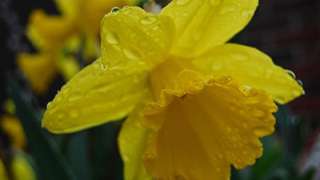MEDIA
'Solitude Is Bliss': Revisiting Wordsworth's 'The Daffodils'
www.thewire.in | May 13, 2020
Solitude is often equated with art, but does everyone crave solitude to write a poem?
Many years ago, I saw a Hindi film whose title I remember not. It was one of those films that you consume and immediately forget. I however distinctly recall a scene from the film. It was an ordinary college room setting with students who did not look earnest. They were poor actors who couldn’t play their part convincingly well. A professor soon walked into class. The cohort looked visibly excited at the prospect of the good looking teacher. So much for ingenuity, I thought! She was going to teach them poetry. I should have known better but I persisted.
The professor asked her students about their favourite poet. A pall of silence descended upon the classroom. Students stared at each other trying hard to remember at least one name. Finally, a hand went up sheepishly and the student cautiously announced, “William Wordsworth.” The professor beamed and the scene was soon replaced by another. But why Wordsworth? Maybe he is really popular or perhaps the scriptwriter didn’t know any better or wanted to showcase a type of students in the classroom.
In retrospect, when I think about the scene, I find it not too difficult to believe. After all, there is no escaping Wordsworth in your school poetry books. If you are studying literature in college, he is a permanent fixture in poetry syllabi. He is synonymous with the Romantic period. It must be said that he is easier to read as compared to colleagues like Byron, Shelley and Keats. And then, he wrote that poem called ‘The Daffodils’ which is the bane of school education.
I had to imagine daffodils in suburban West Bengal, where I grew up and went to school. My teacher, who left her home at the crack of dawn to commute to school, told us that a daffodil was a close kin of the sunflower. I, therefore, read ‘The Daffodils’ thinking of the sunflower. The image was so firmly ingrained that I did not want to test its verisimilitude. Also, we did not learn to read poetry in school. At best, we were taught to summarise the poem. Summary is a communicable disease. It spreads fast like the ongoing pandemic, infecting and robbing people of the desire to read and engage. As if poetry is a riddle best solved through question and answer and reference to contexts.
Wordsworth concludes ‘The Daffodils’ with an admission. He says that solitude is bliss and an essential ingredient for creativity. A lot has been said about this. Literary analyses went into overdrive trying to deconstruct the last stanza of the poem. I wonder if poems often rot like vegetables. Do those poems then generate a smell? If that is true, I would exercise caution with ‘The Daffodils’. How despairing for poetry to be subjected to unrelenting literary analyses! If they could speak, they would perhaps appeal to be left alone. We use poetry during protest and resistance. But what if poems could unite against the perennial tyranny of overanalysis?
Coming back to the poem, Wordsworth says solitude is necessary. It is a desirable state of being which facilitates thinking, reflection and introspection. Such a process births a poem. It almost looks like a route map to poetry, a readymade manual to writing a poem. But it is perhaps only his truth. Does everyone crave solitude to write a poem? Solitude is often equated with art. But how does one identify solitude? How is it to be acquired? As far as I know, being alone is not necessarily solitary. Wordsworth could afford the luxury of solitude, sitting on his couch in a pensive mood and being thoughtful. Solitude is a privilege that perhaps many crave but most don’t have. It is rarefied.
The migrant worker walking from the metropolis to his home in rural India, the daily wage earner waiting for her next meal, the multitudes who sow and reap – do they think about solitude? They wouldn’t perhaps mind the solitude that Wordsworth enjoyed. Solitude is not target-centric. It doesn’t set a goal to accomplish. Wordsworth could ponder, enjoy the process as it were. Others don’t have that luxury. The lack of solitude, however, did not prevent them from singing songs and writing poems as they toiled in the fields or slogged in factories. Their writings emerged as a reaction against feudalism and class oppression. This was a poetry ravaged by experiences of life where each day is a struggle. They injected life and blood and often their sweat into poetry. This poetry is not a result of solitude but a protest against those whose solitude is built upon the sufferings of others.
- Prof. Kunal Ray, Assistant Professor – English Literature
*Views expressed are personal.

